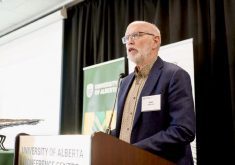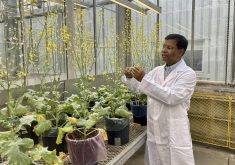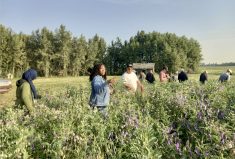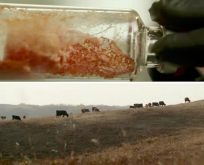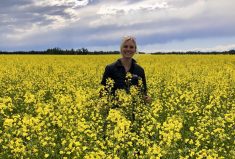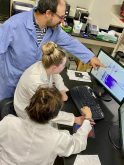Cassidy Marcotte knows horses, operates a cow-calf operation with her fiancé, and has taken basic animal science.
But it was a little overwhelming when the University of Alberta student was given $10 million to start a broiler operation.
“I know a lot about beef but I knew nothing about chickens starting this project,” said Marcotte, who grew up in Grande Prairie. “It’s a really big eye-opener for a lot of people.”
The money, by the way, wasn’t in actual dollars but ‘Frank bucks.’
Read Also

Farming Smarter receives financial boost from Alberta government for potato research
Farming Smarter near Lethbridge got a boost to its research equipment, thanks to the Alberta government’s increase in funding for research associations.
That would be Frank Robinson, a department of agriculture life and environmental sciences professor (and poultry expert) who came up with the idea of “The Game of Farm Life.”
But while the currency wasn’t real, the stakes were high for the 98 students in the animal science 101 course taught by Robinson and fellow professor, Martin Zuidhof — 38 per cent of their final mark was based on the game.
“In general, they wanted us to have an idea of how much profit we’re making,” said Marcotte. “It had to be above 10 per cent and we’re making about five per cent at the moment.
“It’s a lot more difficult than you think it is. You get $10 million, and you think, ‘That’s a lot of money.’ And then you’re like, ‘That’s not lots.’”
The students, divided into groups of 10 or 12, weren’t allowed to pick the type of livestock they thought might earn them $1 million a year. Instead, the groups met at a hall in Parkland County, where they were introduced to a farmer representing one of nine livestock commodities.
“We met our commodity specialist, a lady named Tara who has been running her own broiler farm for 10 years,” said Marcotte. “We had dinner with her and got to ask many questions about her farm and how it runs.”
The students could also email their farmer when creating their one-year operating budget. Marcotte had to come up with the nutrition program (and feed costs) for the flock while others took on tasks such as marketing and branding. About half were city kids.
“Our farm manager is a total city girl from St. Albert,” she noted.
In addition to classroom learning, the students toured six livestock operations and had to obtain their Canadian Animal Handling Certificates from the Canadian Council on Animal Care.
The game was an add-on that Robinson designed last year while Zuidhof was on sabbatical. The two are known for their innovative approach to teaching animal agriculture. For years, animal science students put on “There’s a Heifer in Your Tank” — a mix of standup comedy and Q&As about livestock.
“The Game of Farm Life” is a fun approach with a serious purpose.
“If I can just reflect back to where the students started and what they knew about farming and if I listen to them now, there is a world of growth,” said Zuidhof. “Over the term, students have had an opportunity to ask questions that if they didn’t have something tangible that they were working towards, they just wouldn’t get into the nitty-gritty like they have.
“This has been a really effective project to get the students digging into what farming is really all about.”
Zuidhof has even heard some students say they’re changing their major to agriculture.
“Frank is a genius when it comes to experiential learning opportunities,” he said.
One of the major strengths of the game is that students interact with farmers.
“It just opens their eyes. Frank knows a lot, and I know a lot, but we’re not farmers,” said Zuidhof. “They have a whole different perspective on it. It’s really appropriate for students to learn from actual farmers, not just their profs.”
And they can make big money — the ‘Frank bucks’ version, that is.
At an open house earlier this month, each group made a PowerPoint pitch to a panel of 16 judges, including Lakeland College dean, Josie Van Lent; Leona Staples, co-owner of The Jungle Farm at Innisfail; Gentec CEO Graham Plastow; and farm journalist Dianne Finstad.
Beauvallon cattle producer Miles Wowk then auctioned off the farms to the judges, who each started with $15-million worth of the alternative currency and traded with each other to build up their fake bank account.
Retired Alberta Agriculture deputy minister John Knapp ended up with $57 million — and spent it on a sheep farm.
“This project did a good job of helping students understand the complexity of agriculture and really helped them get their hands and feet into the industry,” said Robinson. “A lot of them have made contacts that will help them out as well.”




